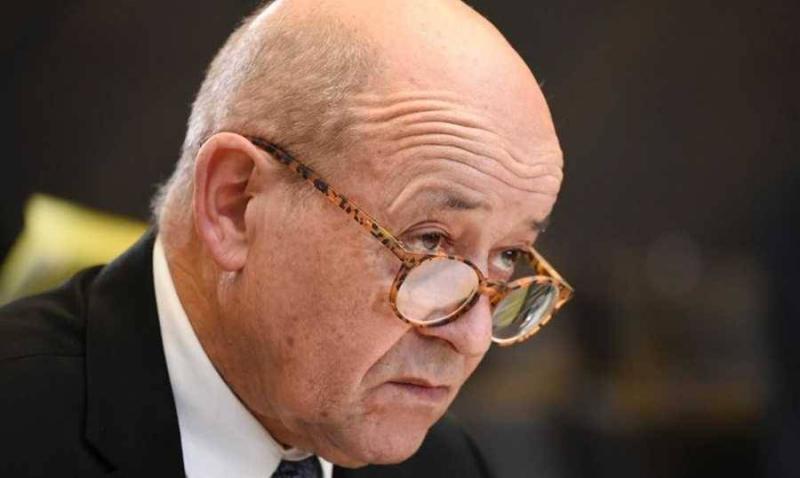There is a prevailing impression within political circles that the French presidential envoy Jean-Yves Le Drian is navigating alone, away from coordination with the international and Arab quintet, which supposedly tasked France with finding a way out of the entrenched crisis in Lebanon, according to "Nidaa al-Watan". This is reflected in the positions of several MPs and their handling of his "dialogue" questions directed to the Speaker of the House. The conclusion regarding the current situation is that Paris is returning to outright bias towards Sleiman Frangieh following the failure of previous balancing maneuvers, threatening to plunge the country into high-pressure and tension phases, linked to developments in Syria and Iraq.
It can be confirmed that strict diplomatic messages from Arab countries have reached all concerned parties specifically regarding political and presidential matters, summarizing that Le Drian is acting independently and not on behalf of the Group of Five, and that any outcomes he achieves are non-binding for the rest of its members. These countries do not agree with the French approach and will not endorse it, particularly the novel approach of sending messages to the Parliament. Diplomatic messages have emphasized that Arab states are aware of the interests that need securing in Lebanon, and that the priority is to restore the state and combat corruption, hinting at Paris's involvement in dubious mechanisms to secure its own interests in Lebanon, including port commitments and covering dams, among other things.
Political sources mentioned that most opposition blocs and independents now consider Le Drian as one of the Iranian Revolutionary Guard officials dressed in Christian Dior, given the intense pressures he exerted to secure the interests of "Hezbollah" after his failed attempts to present himself as a neutral mediator in the crisis and his previous media clashes with the party. This will reflect in the stances of opposition forces more if the French bluntness regarding the Lebanese file continues.
The Shiite insistence to hold on to Le Drian's initiative, as expressed by MPs from "Hezbollah" and the "Amal" movement in an exaggerated manner, reveals the stark reality we’ve reached: a crude convergence of Iranian and French interests in Lebanon versus the reform and state-building vision upheld by the remaining countries of the quintet with Paris: the United States, Saudi Arabia, Qatar, and Egypt. This is parallel to media threats attributed to Le Drian warning about the implications of the failure of his initiative on the situation in Lebanon.
This is precisely what is being focused on at the political and security level in Lebanon and the region: what comes after the expected failure of Le Drian’s initiative? How will the relationship among the quintet members be affected by France’s overt bias towards Frangieh? And why is there a promotion for major security shocks sweeping the country in parallel with Hezbollah's return to invoking the terrorist organization "ISIS" and claiming it has decided to return to Lebanon?
It’s certain that the deep French state, with its security and diplomatic apparatuses facing consecutive losses in the Middle East and Africa, will not abandon Lebanon not merely because it represents the land of the cedars established by General Gouraud and colonized by Paris as a mother to the Maronites, but as a launchpad for its interests in the Arab region, with a decisive shift in its alliances represented by the support of the minority coalition from Lebanon to Syria and Iraq and the objective alliance with "Hezbollah".
The Sunni withdrawal has revealed the progress of the Iranian campaign against Christians in the region. One of the most perilous episodes was the decision to withdraw the presidential decree concerning Cardinal Louis Raphael Sako, made by the Iraqi presidency, leading to his departure from the patriarchal headquarters in Baghdad to a monastery in the Kurdistan region, in a move that targeted one of the oldest churches in the East, clearly illustrating how matters are managed in Baghdad where Tehran exerts its influence over the authorities.
In Lebanon, the truth of the crisis has emerged, especially between Christians and "Hezbollah" and its arms. The incident in Kahaleh exposed that there is no supportive environment for the party's arms in Lebanon, but the current danger lies in the convergence of the French and Iranian policies aiming to subjugate Lebanon's Christians to the party's will, which is feared to have severe field consequences, confirming the beliefs that a solution to the presidential, constitutional, and institutional crisis is unlikely in the near future. French diplomacy has lost its available maneuvering space, and the situation has now reverted to sharp local, regional, and international alignments, along with major developments in Iraq and Syria, highlighting dangers of sectarian division that could lead to a new map in Syria initially, which will have repercussions since Paris insists on its approach to compensate Iran in Lebanon for the potential fall of Assad in Syria, an approach that will take on a serious character with the escalation of events in Syria and the resulting transformations.




